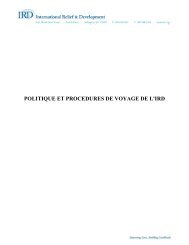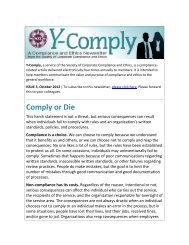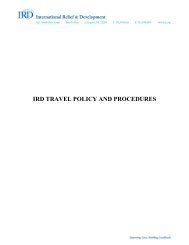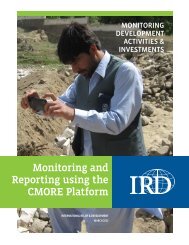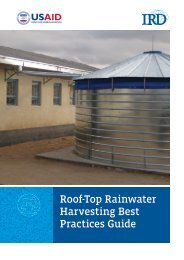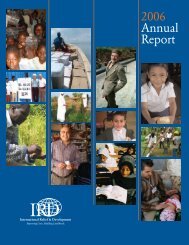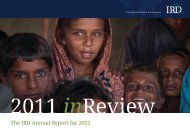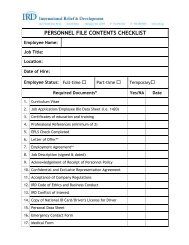INTERNAL AUDIT POLICY AND PROCEDURE - International Relief ...
INTERNAL AUDIT POLICY AND PROCEDURE - International Relief ...
INTERNAL AUDIT POLICY AND PROCEDURE - International Relief ...
Create successful ePaper yourself
Turn your PDF publications into a flip-book with our unique Google optimized e-Paper software.
<strong>INTERNAL</strong> <strong>AUDIT</strong> <strong>POLICY</strong> <strong>AND</strong> <strong>PROCEDURE</strong>
Title: Internal Audit Policy and Procedure Effective Date: 03/04/11<br />
INTRODUCTION:<br />
Internal Auditing is an independent and objective assurance and consulting activity that is guided<br />
by a philosophy of adding value to improve the operations of <strong>International</strong> <strong>Relief</strong> &<br />
Development (“IRD”). Internal Auditing is related to but distinct from IRD’s retention of an<br />
independent auditor in that an independent auditor is utilized to evaluate and verify IRD’s annual<br />
financial position, while internal auditing is utilized to evaluate and improve the effectiveness of<br />
the organization’s risk management, control, and governance processes<br />
ST<strong>AND</strong>ARDS OF CARE:<br />
The internal audit activity will adhere to The Institute of Internal Auditors (“IIA”)’s mandatory<br />
guidance including the Definition of Internal Auditing, the Code of Ethics, and the <strong>International</strong><br />
Standards for the Professional Practice of Internal Auditing (Standards). IIA’s mandatory<br />
guidance constitutes principles of the fundamental requirements for the professional practice of<br />
internal auditing and for evaluating the effectiveness of the internal audit activity.<br />
The IIA’s Practice Advisories, Practice Guides, and Position Papers will also be adhered to as<br />
applicable to guide operations. In addition, the internal audit activity will adhere to <strong>International</strong><br />
<strong>Relief</strong> and Development relevant policies and procedures.<br />
ACCESS <strong>AND</strong> COOPERATION:<br />
The internal audit activity, with strict accountability for confidentiality and safeguarding records<br />
and information, is authorized full, free, and unrestricted access to any and all of IRD records,<br />
physical properties, and personnel pertinent to carrying out any engagement. All employees are<br />
requested to assist the internal audit activity in fulfilling its roles and responsibilities.<br />
ORGANIZATION:<br />
The Director of Internal Audit will report to the Chief Executive Officer. The Director of<br />
Internal Audit will communicate and interact directly with the Board Audit Committee in<br />
accordance with the Board Audit Committee Charter, including in executive sessions and<br />
between Board meetings as appropriate. The Board Audit Committee will be apprised of all<br />
management decisions regarding the performance evaluation, appointment, or removal of the<br />
Director of Internal Audit.<br />
INDEPENDENCE <strong>AND</strong> OBJECTIVITY:<br />
The internal audit activity will remain free from interference by any element in the organization,<br />
including matters of audit selection, scope, procedures, frequency, timing, or report content to<br />
permit maintenance of a necessary independent and objective mental attitude.<br />
Internal auditors will have no direct operational responsibility or authority over any of the<br />
activities audited. Accordingly, they will not implement internal controls, develop procedures,<br />
install systems, prepare records, or engage in any other activity that may impair internal auditor’s<br />
judgment. However, internal auditors may make recommendations regarding what internal<br />
Notice: A printed copy of this document may not be the latest version.<br />
Available online: https://portal.ird.org<br />
Updated: March 2011 2
Title: Internal Audit Policy and Procedure Effective Date: 03/04/11<br />
controls, procedures, or systems may be advisable in order to strengthen IRD’s internal controls<br />
and overall level of compliance.<br />
PROFESSIONALISM:<br />
Internal auditors must exhibit the highest level of professional objectivity in gathering,<br />
evaluating, and communicating information about the activity or process being examined.<br />
Internal auditors must make a balanced assessment of all the relevant circumstances and not be<br />
unduly influenced by their own interests or by others in forming judgments.<br />
CONFIDENTIALITY:<br />
Internal auditors will respect the value and ownership of information they receive and will not<br />
disclose information without appropriate authority unless there is a legal or professional<br />
obligation to do so.<br />
RESPONSIBILITY:<br />
The scope of internal auditing encompasses, but is not limited to, the examination and evaluation<br />
of the adequacy and effectiveness of the organization, risk management, and internal process as<br />
well as the quality of performance in carrying out assigned responsibilities to achieve the<br />
organization’s stated goals and objectives. This includes:<br />
<br />
<br />
<br />
<br />
<br />
<br />
<br />
<br />
<br />
<br />
Evaluating the reliability and integrity of information and the means used to identify,<br />
measure, classify, and report such information.<br />
Evaluating the systems established to ensure compliance with those policies, plans,<br />
procedures, laws, and regulations which could have a significant impact on the<br />
organization.<br />
Evaluating the means of safeguarding assets and, as appropriate, verifying the existence<br />
of such assets.<br />
Evaluating the effectiveness and efficiency with which resources are employed.<br />
Evaluating operations or programs to ascertain whether results are consistent with<br />
established objectives and goals and whether the operations or programs are being carried<br />
out as planned.<br />
Making recommendations regarding what internal controls, procedures, or systems may<br />
be advisable in order to strengthen IRD’s internal controls and overall level of<br />
compliance<br />
Verifying the extent to which recommendations are implemented and commenting on the<br />
effectiveness of such recommendations.<br />
Monitoring and evaluating the effectiveness of the organization's risk management<br />
processes.<br />
Coordinating activities, as required with external auditors.<br />
Performing consulting and advisory services related to governance, risk management and<br />
control as appropriate for the organization.<br />
Notice: A printed copy of this document may not be the latest version.<br />
Available online: https://portal.ird.org<br />
Updated: March 2011 3
Title: Internal Audit Policy and Procedure Effective Date: 03/04/11<br />
<br />
<br />
<br />
<br />
<br />
<br />
Providing leadership, oversight and assistance for audits, reviews, and investigations<br />
directed or undertaken by donor or related organizations.<br />
Reporting periodically on the internal audit activity’s purpose, authority, responsibility,<br />
and performance relative to its plan.<br />
Reporting significant risk exposures and control issues, including fraud risks, governance<br />
issues, and other matters needed or requested by the Board.<br />
Assisting with the submission of disclosures to donor or related organizations and the<br />
reconciliation thereof.<br />
Developing and maintaining a professional cadre of qualified and skilled internal<br />
auditors.<br />
Evaluating specific operations at the request of the Board or management, as appropriate.<br />
<strong>INTERNAL</strong> <strong>AUDIT</strong> PLAN:<br />
In January of each year, or at such time the Board Audit Committee may designate, the Director<br />
of Internal Audit will submit to senior management and the Board Audit Committee an internal<br />
audit plan for review and approval. The internal audit plan will consist of a work schedule as<br />
well as budget and resource requirements for the upcoming calendar year.<br />
The internal audit plan will be developed based on a prioritization of the audit universe using a<br />
risk-based methodology, including input of senior management. Any significant deviation from<br />
the approved internal audit plan will be communicated with timely notice to senior management<br />
and the Board Audit Committee through periodic activity reports.<br />
REPORTING <strong>AND</strong> MONITORING:<br />
A written report will be prepared and issued by the Director of Internal Audit or designee<br />
following the conclusion of each internal audit engagement and will be distributed as<br />
appropriate.<br />
The internal audit report may include management’s response and corrective action taken or to<br />
be taken in regard to the specific findings and recommendations. Management's response,<br />
whether included within the original audit report or provided thereafter (i.e. within thirty days)<br />
by management of the audited area should include a timetable for anticipated completion of<br />
action to be taken and an explanation for any corrective action that will not be implemented.<br />
The internal audit activity will be responsible for appropriate follow-up on engagement findings<br />
and recommendations. All significant findings will remain in an open issues file until cleared.<br />
PERIODIC ASSESSMENT:<br />
The Director of Internal Audit will periodically report to senior management and the Board<br />
Audit Committee on the internal audit activity’s purpose, authority, and responsibility, as well as<br />
performance relative to its plan. Reporting will also include significant risk exposures and<br />
control issues, including fraud risks, governance issues, and other matters needed or requested by<br />
senior management and the Board.<br />
Notice: A printed copy of this document may not be the latest version.<br />
Available online: https://portal.ird.org<br />
Updated: March 2011 4
Title: Internal Audit Policy and Procedure Effective Date: 03/04/11<br />
In addition, the Director of Internal Audit will communicate to senior management and the<br />
Board Audit Committee on the internal audit activity’s quality assurance and improvement<br />
program, including results of ongoing internal assessments and external assessments conducted<br />
at least every five years.<br />
In accordance with the Board Audit Committee Charter, the Board Audit Committee will<br />
provide informal or formal feedback and commentary related to the performance of the Director<br />
Internal Audit and the internal auditing function as a whole.<br />
Notice: A printed copy of this document may not be the latest version.<br />
Available online: https://portal.ird.org<br />
Updated: March 2011 5


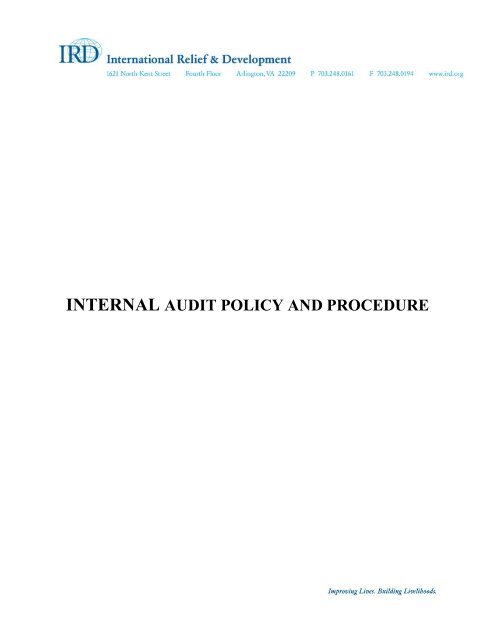
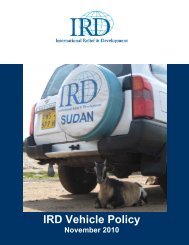

![Guide bonne pratique production d'oignon qualité_VF_4_2411012[1]](https://img.yumpu.com/23506639/1/184x260/guide-bonne-pratique-production-doignon-qualitac-vf-4-24110121.jpg?quality=85)
